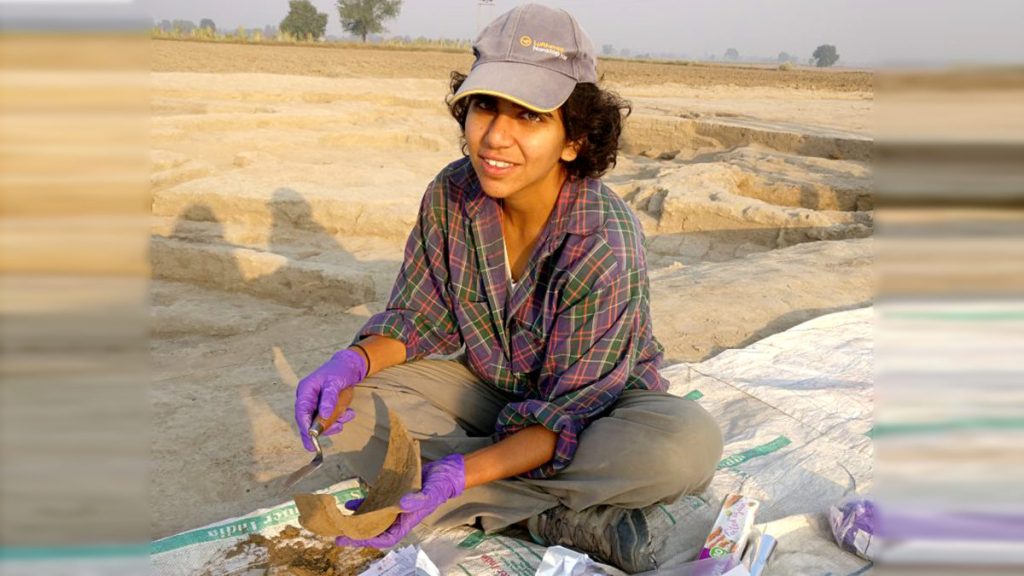A recent study published in the Journal of Archaeological Science on Dec 9, 2020, has revealed the food habits of the people of the Indus Valley Civilization. Traces of the meat of animals like sheep, cattle, pigs, goat and buffalo along with dairy products were found on ancient ceramic vessels at Indus Valley sites in the present-day states of Uttar Pradesh and Haryana in India.
The Indus Valley Civilization was South Asia’s first urban civilization with archeological sites spread across Pakistan, and northwest and west India. Though much is known about its modern architecture and drainage system, not many are aware of the food habits of its people.
The study was led by Dr Akshyeta Suryanarayan, a post-doctoral researcher at CEPAM (Cultures et Environnements. Préhistoire, Antiquité, Moyen Âge), CNRS (Centre National de la Recherché Scientifique), Nice, France. It specifically looked at vessels that dated to the urban Mature Harappan period (c. 2600/2500-1900 BC) and the post-urban Late Harappan period (c.1900-1300 BC).
“This is the first systematic study that looks at what was cooked or stored in ancient vessels from multiple sites in the Indus Civilization,” said Suryanarayan. “The study provides chemical evidence of milk products, meat, and possible mixtures of products and/or plant consumption in pottery vessels,” Suryanarayan told Zenger News.

“This study used a technique known as ceramic lipid analysis to extract and identify fats, waxes and resins absorbed in ancient pottery vessels,” she said talking about the process behind the findings. “Another complementary technique called GC-C-IRMS enabled the identification of carcass (meat) and milk fat (products like cheese, butter, ghee, yogurt).”

Suryanarayan mentioned that the technique of ceramic lipid analysis has been used for over 20 years in different archeological contexts of the world, but had seen limited application in South Asian archeology.
This is partly because of the challenges related to the poor preservation of organic remains in the region. However, because of the developments in the field, it is now possible to extract lipids from pottery found in regions even with poor organic preservation.
“I think this study opens up a new way to examine the eating habits and culinary practices of the Indus civilization as it focuses on vessel usage and highlights that pottery can be used to explore questions about everyday life and not just used as a cultural and chronological marker, as is often done in South Asian archeology.”
The findings question the perception of India being a historically vegetarian society, which the BJP and the RSS (both right-wing Hindu nationalist organizations) advocate repeatedly.
Ever since it came to power, there have been several attempts by the BJP to vilify meat-eating. In April 2018, the Ministry of Health and Family Welfare tweeted a photo about choosing a “healthier” diet. It contained caricatures of two women, one overweight, and the other slim. It advocated that the thin one ate only fruits and vegetables while the fat one consumed meat, eggs, sausages, and fries. Facing criticism, the Ministry soon removed the picture from its Twitter feed.
“Many archeologists specializing in animal bones have reported the presence of different types of animal bones at Indus sites, which include cattle, water buffalo, sheep, goat, pig, wild deer and fish. Many of these bones have butchery marks on them which indicate they were used for meat,” said Suryanarayan.
Dr Vasant Shinde, fellow researcher and archeologist from Deccan College, Pune, corroborated the claim.
“Excavations did yield animal bones with cut marks which led to us guess that meat was a part of the diet. This was later verified by scientific methodologies,” he said. “However, it is wrong to say the Harappans (the people of the Indus Valley Civilization) were predominantly meat-eaters. Their staple diet also included wheat, barley, rice and vegetables. Also, it is not clear whether all people consumed animal food or only a certain section of the population did.”

(1a) and study sites in white. (1b) Other Indus settlements are in yellow. (Akshyeta Suryanarayan)
The idea that vegetarianism was the predominant dietary practice in India is popular in the west as well. While public government surveys claim that 23-37 percent of Indians are vegetarian, research by US-based anthropologist Balmurli Natrajan and India-based economist Suraj Jacob indicates that these are miscalculated estimations.
Due to the existing political and cultural milieu, people under-report eating meat (particularly beef) and over-report eating vegetarian food. They conclude that in reality, approximately 15 percent of Indians (about 180 million people) eat beef, which questions the government survey’s claim of 7 percent.
Dr Ravindra Nath Singh, a fellow researcher in Suryanarayan’s study and a professor of archaeology at Banaras Hindu University contends that the abundance of grains encountered in the excavations clearly suggest and confirm that the Harappans were predominantly a vegetarian society. According to him, the consumption of non-vegetarian food was certainly there but to a limited extent.

“Many bone tools have also been reported from our excavations. Bones were first boiled in order to make tools that could function better. Hence, evidence of lipid (fat) in the vessels may not be an indicator that bones were cooked for eating purposes only,” claims Dr Singh.
(Edited by Anindita Ghosh and Uttaran Dasgupta)
The post Study Reveals What Ancient Indians Ate appeared first on Zenger News.


